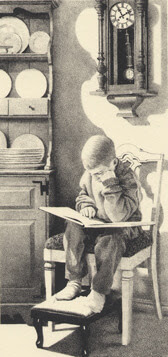Time is . . .
By Al R. Young
 |
| Haven, by Al R. Young |
I don't remember when I first heard the axiom: Time is money. The succinctness of the dictum asserts its own truth as though it were left over from the sunrise of creation, when simple sentences framed the making of the world.
It comes, instead, from the pen of Benjamin Franklin, and is part of a 1748 letter entitled Advice to a Young Tradesman. The letter is signed with no more assertion than that of "An Old Tradesman," and this is the short paragraph to which the statement belongs:
Remember, that time is money. He that can earn ten shillings a day by his labor, and goes abroad, or sits idle, one half of that day, though he spends but six pence during his diversion or idleness, ought not to reckon that the only expense; he has really spent, or rather thrown away, five shillings besides.
The rest of the letter is not without useful advice, nor does it want helpful intent, but what a dreadful, deadly penury of reasoning! To be fair, Franklin is talking to a tradesman and money is his theme. When he comes to the summation of his advice, he begins: In short, the way to wealth, if you desire it . . .
When time was made, as part of the making of the world, it was done by faith; that is, by means of believing, which is the genesis of all action. Time is for believing. Perhaps that is why I like these words from the English poet Phillip James Bailey (1816-1902):
We live in deeds, not years; in thoughts, not breaths;
In feelings, not in figures on a dial.
We should count time by heart-throbs. He most lives
Who thinks most, feels the noblest, acts the best.
Tags: 2012, Inspiration and creativity
Browse articles by year: 2026 . 2025 . 2024 . 2023 . 2022 . 2021 . 2020 . 2019 . 2018 . 2017 . 2016 . 2015 . 2014 . 2013 . 2012 . 2011 . 2010 . 2009 . 2008 . 2007 . 2006 . 2005 . 2004 . 2003 . 2002 . 2001 . 2000 . 1999 . 1998 . 1997 . 1996
Browse articles by topic: Art lessons . BenHaven Archives . Blank art diaries . Fine art photography . Framing . Illustration . Inspiration and creativity . Isles of Rune . Limited Editions Collection . My Fathers Captivity . News . Novellas . Oil paintings and prints . Operations announcements . Orders and shipping . Overview . Portfolios . The Papers of Seymore Wainscott . Project commentaries . Recipes by Nancy Young . Recommended reading . Recommended viewing . Temple artworks . The Storybook Home Journal . Tips and techniques . Tools supplies and operations
Browse articles by topic: Art lessons . BenHaven Archives . Blank art diaries . Fine art photography . Framing . Illustration . Inspiration and creativity . Isles of Rune . Limited Editions Collection . My Fathers Captivity . News . Novellas . Oil paintings and prints . Operations announcements . Orders and shipping . Overview . Portfolios . The Papers of Seymore Wainscott . Project commentaries . Recipes by Nancy Young . Recommended reading . Recommended viewing . Temple artworks . The Storybook Home Journal . Tips and techniques . Tools supplies and operations